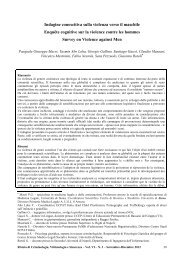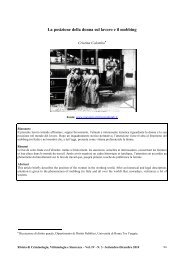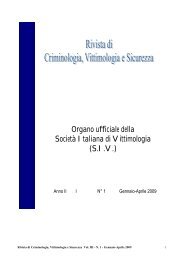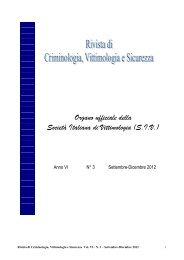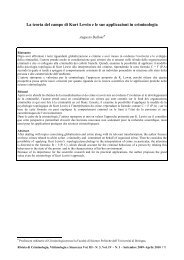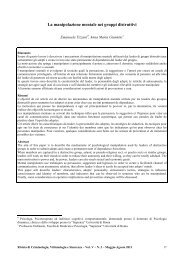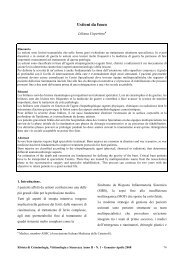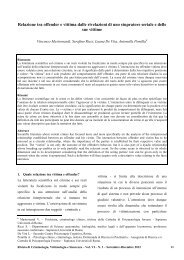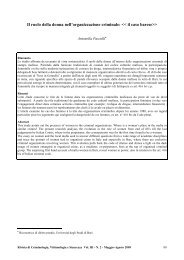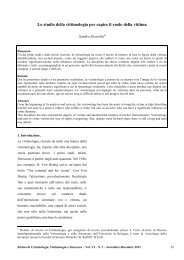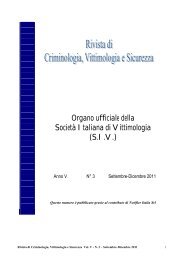Globalization, Transnational Crime and State Power ... - Vittimologia
Globalization, Transnational Crime and State Power ... - Vittimologia
Globalization, Transnational Crime and State Power ... - Vittimologia
You also want an ePaper? Increase the reach of your titles
YUMPU automatically turns print PDFs into web optimized ePapers that Google loves.
to geographic <strong>and</strong> temporal borders has been<br />
matched <strong>and</strong> reflected by challenges to the<br />
boundaries that historically marked the limits of<br />
sovereignty, citizenship, <strong>and</strong> nation-state. In as yet<br />
relatively unexamined ways, these shifts are<br />
evident in the nature of transnational crime, &<br />
animated through state responses to it.<br />
D. Key factors favoring transnational crime.<br />
Some of the more important developments <strong>and</strong><br />
influential factors in the last twenty years or so<br />
are:<br />
1. The changed post-Cold War l<strong>and</strong>scape. The<br />
end of the Cold War resulted in the breakdown of<br />
political <strong>and</strong> economic barriers not only in Europe<br />
but also around the world. This change opened the<br />
way for substantially increased trade, movement<br />
of people, <strong>and</strong> capital flows between democracies<br />
<strong>and</strong> free market countries <strong>and</strong> the formerly closed<br />
societies <strong>and</strong> markets that had been hampered by<br />
Soviet power. The end of the Cold War also<br />
brought with it an end to superpower jockeying<br />
for power in other regions of the world. This<br />
relative peace has allowed international criminals<br />
to exp<strong>and</strong> their networks <strong>and</strong> increase their<br />
cooperation in illicit activities <strong>and</strong> financial<br />
transactions. Moreover, the collapse of the Soviet<br />
Union, just as the overthrow of Saddam Hussein<br />
did in Iraq, threw thous<strong>and</strong>s of state employees<br />
onto the labor market. All sorts of operatives were<br />
now unemployed: secret police,<br />
counterintelligence officers, special-forces<br />
comm<strong>and</strong>os <strong>and</strong> border guards, along with<br />
homicide detectives <strong>and</strong> traffic cops. They were<br />
trained in skills that are quite valuable to<br />
organized crime including surveillance, forging<br />
documents, smuggling, eliminating people,<br />
knowing how to access <strong>and</strong> extort from key<br />
people in banking, finance, transport <strong>and</strong> security,<br />
creating networks <strong>and</strong> blackmail. The demise of<br />
the Soviet Union also ensured a steady supply of<br />
women for Western Europe <strong>and</strong> other markets <strong>and</strong><br />
gave criminal gangs profitable areas for their<br />
activities like the sex trade, smuggling of<br />
cigarettes <strong>and</strong> other goods, drug trafficking <strong>and</strong><br />
more 22 .<br />
2. Economic <strong>and</strong> trade liberalization. Increasing<br />
economic interdependence has both promoted <strong>and</strong><br />
benefited from reforms in many countries opening<br />
or liberalizing state-controlled economies with the<br />
intention of boosting trade <strong>and</strong> becoming more<br />
competitive in the global marketplace. Criminals<br />
have taken advantage of transitioning <strong>and</strong> more<br />
open economies to establish front companies <strong>and</strong><br />
quasi-legitimate businesses that facilitate<br />
smuggling, money laundering, financial frauds,<br />
piracy of intellectual property, identity theft <strong>and</strong><br />
other illicit ventures. Bilateral or multilateral<br />
economic agreements reducing trade barriers in<br />
North America, Europe, Asia, <strong>and</strong> other regions of<br />
the world have substantially increased the volume<br />
of international trade. Criminal <strong>and</strong> terrorist<br />
groups 23<br />
have taken advantage of the high <strong>and</strong><br />
growing volume of legitimate trade to smuggle<br />
along drugs, arms, people <strong>and</strong> other contrab<strong>and</strong><br />
across national boundaries. At the same time<br />
liberalized financial <strong>and</strong> commodities markets<br />
have offered lucrative new opportunities for<br />
criminal syndicates, facilitated by the wide-open<br />
possibilities offered by the use of computers <strong>and</strong><br />
of the internet.<br />
22 M. Glenny, McMafia: A Journey through the Global<br />
Criminal Underworld, London, Knopf, 2008.<br />
23 A. Lambert, “Underground Banking <strong>and</strong> Financing of<br />
Terrorism”, Fla. J. Int’l L., 15, 2002, pp. 9-12.<br />
Rivista di Criminologia, <strong>Vittimologia</strong> e Sicurezza Vol. III - N. 3, Vol. IV – N. 1 – Settembre 2009–Aprile 2010 68



